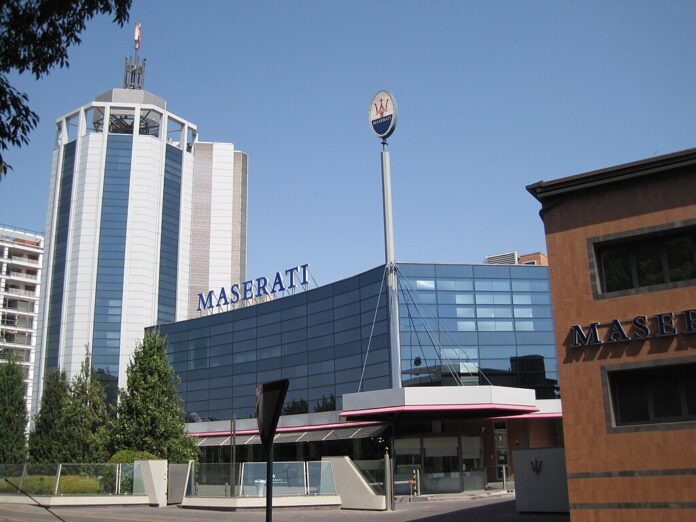The Italian luxury brand retires its iconic saloon and SUV models, marking a shift towards electrification with future models expected to be electric-only
Maserati has announced the discontinuation of its Quattroporte saloon and Levante SUV, signalling the end of an era for the brand’s V8 engines. This move follows the earlier cessation of the Ghibli saloon, which had been a staple since 2013. All three models were built on the M156 platform and produced at the Mirafiori factory alongside newer models like the Maserati Granturismo and Fiat 500e.
The Quattroporte and Levante were notable for featuring the twin-turbocharged 3.8-liter V8 engine, known as the ‘F134’, which was developed by Ferrari. The V8 engine’s final appearance was in the Quattroporte Grand Finale, a custom model designed for a US-based owner, marking the end of an era for Maserati’s performance lineup.
Embed from Getty ImagesMaserati’s current lineup now includes only three core models: the GranTurismo, the Grecale SUV, and the MC20 supercar. The company has announced a shift towards electrification with its Folgore BEV program. The Granturismo and Grancabrio are available in both internal combustion engine (ICE) and battery electric vehicle (BEV) versions, while the Grecale offers ICE, mild-hybrid, and BEV options. The company is also preparing successors for the Quattroporte and Levante, with an electric-only Levante expected to be among the first new models introduced.
Davide Danesin, Maserati’s chief engineer for the Quattroporte and GranTurismo, indicated that the development of the new electric Quattroporte was about halfway completed before being delayed to 2028. He emphasized the importance of the vehicle’s performance, particularly its range, aiming for more than 600 kilometres (373 miles) on a single charge.
The retirement of these models comes amid financial challenges for Maserati and its parent company Stellantis. Carlos Tavares, CEO of Stellantis, recently hinted that Maserati could be sold if its financial situation did not improve. However, Stellantis later clarified its commitment to its brands, stating that each brand has a ten-year window to achieve profitability and sustainability.
Maserati acknowledged the hurdles it faces, stating, “Maserati is facing a major challenge and must remain focused on its objectives in the coming months.” The company is committed to navigating the transition towards an all-electric future while addressing its financial and market positioning challenges.
Analysis:
Political:
The decision to retire Maserati’s V8 models and shift towards electrification reflects broader trends in the automotive industry and regulatory pressures. Governments worldwide are increasingly mandating stricter emissions regulations and pushing for the adoption of electric vehicles (EVs). Maserati’s move aligns with these political mandates, showcasing how car manufacturers must adapt to comply with evolving environmental policies. The decision also highlights the role of parent companies like Stellantis in influencing strategic shifts within their brands, reflecting the interplay between corporate strategies and regulatory frameworks.
Social:
The end of Maserati’s V8 era and the introduction of electric models resonate with societal trends towards sustainability and innovation. As consumers become more environmentally conscious, there is a growing demand for cleaner and more efficient transportation options. Maserati’s transition to electric vehicles aligns with this shift, reflecting changing consumer values and the broader societal move towards reducing carbon footprints. Additionally, the retirement of iconic models like the Quattroporte and Levante underscores the impact of societal preferences on automotive design and production.
Racial:
While the retirement of Maserati’s V8 models does not directly address racial issues, it intersects with broader discussions about diversity and inclusion in the automotive industry. The shift towards electric vehicles reflects a global trend towards technological innovation and sustainability, which includes diverse perspectives and contributions from around the world. Maserati’s move can be seen as part of a larger effort to engage with international markets and diverse consumer bases, highlighting the industry’s response to global demands and the diverse influences shaping automotive trends.
Gender:
The transition from V8 engines to electric models in the automotive industry can indirectly relate to gender issues by reflecting changing consumer demographics and preferences. The growing emphasis on sustainability and technology aligns with evolving gender roles and expectations in the automotive sector. Women are increasingly influencing automotive design and consumption patterns, and the industry’s shift towards electric vehicles may reflect broader changes in gender dynamics and the role of women in driving sustainability agendas.
Economic:
Maserati’s decision to retire the Quattroporte and Levante and focus on electrification has significant economic implications. The shift towards electric vehicles represents a strategic response to market demands and regulatory pressures, potentially impacting Maserati’s financial performance and market positioning. The discontinuation of high-performance V8 models could affect sales and brand perception, while the investment in electric vehicles represents a significant financial commitment. Additionally, the financial challenges faced by Maserati and Stellantis highlight the economic pressures on automotive manufacturers to balance innovation, profitability, and sustainability.
